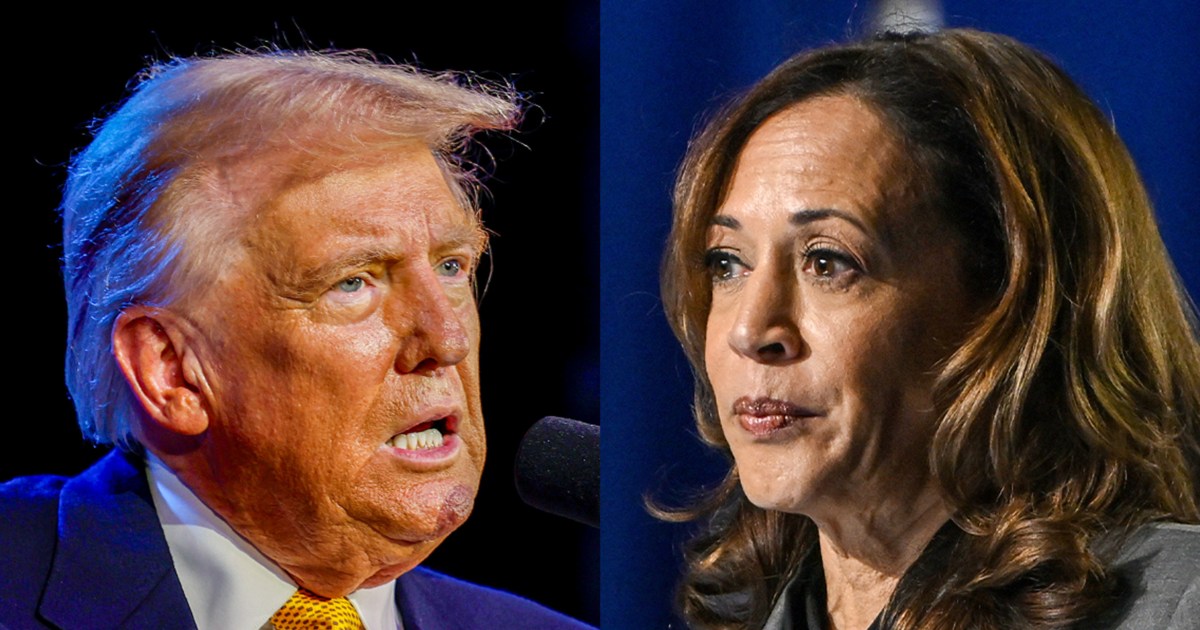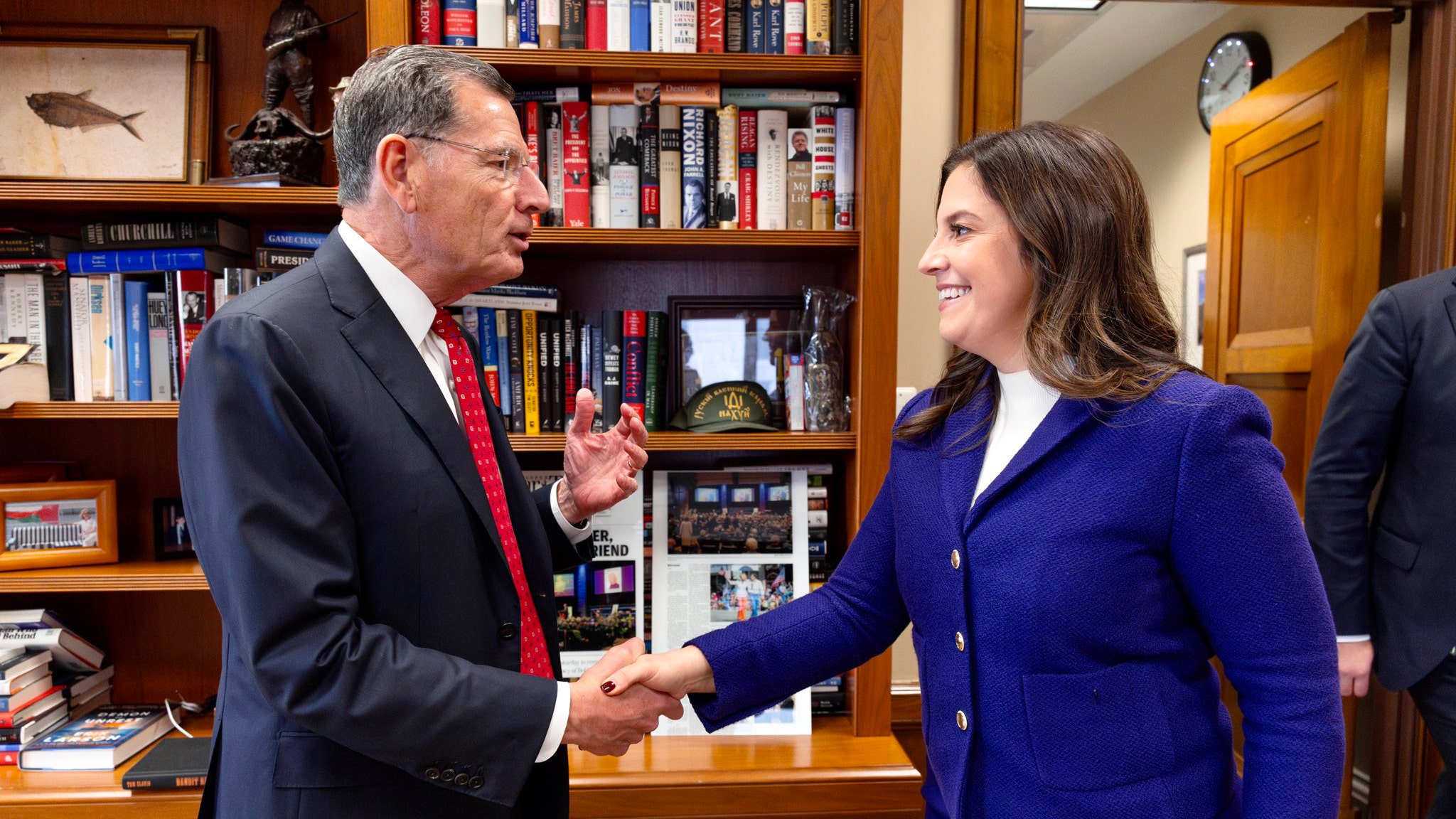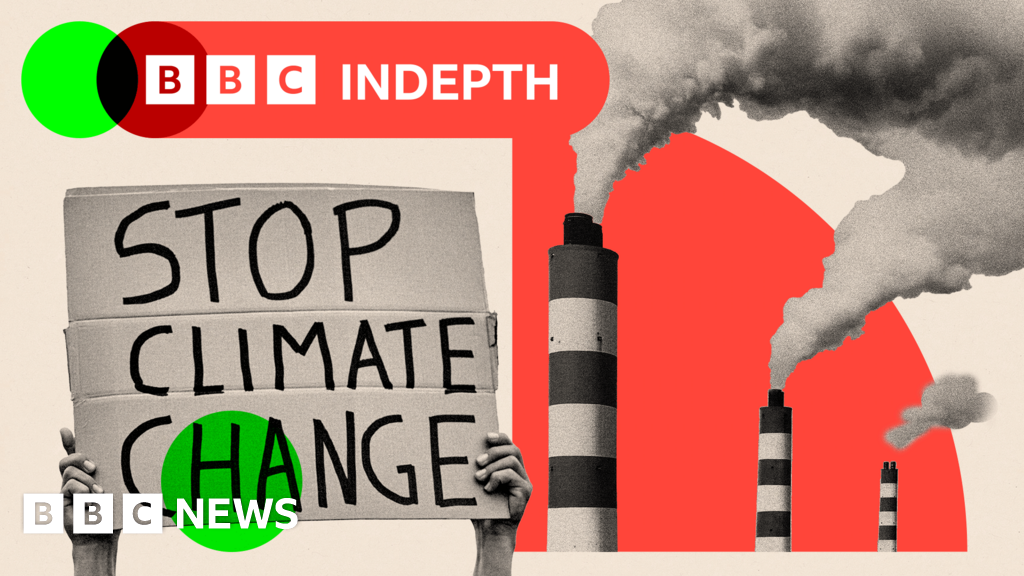World
Election 2024 live updates: Harris sits down with NBC; Trump rallies in battleground North Carolina

Arnold Palmer’s daughter on Trump’s vulgar remarks: ‘In my father’s world, this wouldn’t be acceptable’
A daughter of the golfing icon Arnold Palmer said last night on CNN that Trump’s vulgar remarks about her father over the weekend are not acceptable.
Asked if anyone in Trump’s world reached out to her after the former president’s comments, Peggy Palmer Wears said: “They probably have a long line of people to reach out to because it seems to be something he does. Again, it’s locker room talk, it’s something he seems to think is acceptable. In my father’s world, this wouldn’t be acceptable.”
At his campaign rally Saturday in Latrobe, Pennsylvania, Trump suggested that Palmer, who died in 2016, had unusually large genitalia.
Can you spot the celebrity ‘deepfakes’ in a new ad warning against election disinfo?
A new public service campaign featuring the actor Rosario Dawson and other Hollywood stars aims to alert Americans not to be duped by AI-generated deepfakes designed to mislead them about when, where and how to vote on Election Day.
“If something seems off, it probably is,” Dawson warns in the video spot, shared exclusively with NBC News.
Other celebrities featured in the video include Chris Rock, Laura Dern, Michael Douglas, Amy Schumer and Jonathan Scott delivering the message that Americans should rely on state secretaries of state for information about voting in the 2024 election and not to fall for unverified claims about alleged changes at polling stations.
The celebrities say Americans may receive a fake message claiming voting has been extended, or a polling location has closed or changed due to an emergency, or that new documentation is required to vote. “These are all scams designed to trick you into not voting. Don’t fall for it,” the celebrities say. At the end, the video reveals that some of the Hollywood stars are mere deepfakes, with their voices and images superimposed on other actors.
Who does China’s president want to win the U.S. election?
HONG KONG — One is a former president who vows to double down on the trade war he started with China but could stoke global instability to Beijing’s benefit. The other is a vice president who might be more conciliatory in the short term but could rally U.S. allies against China’s growing global influence.
Which U.S. presidential candidate would Chinese President Xi Jinping rather work with?
Whoever wins the White House next month — Trump or Harris — will determine the tone and much of the substance of the relationship between the world’s two largest economies.
Worried by fall of Roe v. Wade, organizers get same-sex marriage on the ballot in three states
Two years after the Supreme Court overturned Roe v. Wade, doing away with a half-century of precedent, activists worried that other high court decisions could be in jeopardy are taking their concerns to the polls. California, Colorado and Hawaii will soon allow their residents to vote on ballot measures that would remove language from their state constitutions prohibiting same-sex marriage.
The landmark 2015 Obergefell v. Hodges ruling, guaranteeing same-sex couples across the country the right to marry, makes these state bans unenforceable. However, these ballot measures seek to proactively protect these marriage rights should Obergefell ever be overturned.
Paul Smith, a Georgetown law professor who argued the landmark 2003 Supreme Court case Lawrence v. Texas, which struck down the country’s remaining anti-sodomy laws, said the high court’s Dobbs v. Jackson Women’s Health Organization decision, which struck down the landmark 1973 Roe v. Wade abortion ruling, should serve as a cautionary tale.
“We’ve had the example of how Dobbs can take down a long-standing precedent. Suddenly there are these state laws that were sitting there dormant, that came springing back to life,” he said, referring to the dozens of states that now have abortion bans following the Dobbs decision. “These states don’t want their same-sex marriage bans to come springing back to life, so they’re going to do something about it, if just in case.”
Harris campaigned across Pennsylvania, Michigan and Wisconsin yesterday, joined by GOP former Rep. Liz Cheney who urged Republican-leaning voters to back Harris. Meanwhile, Trump wrapped up a three-stop day in North Carolina where he courted Christian voters. NBC’s Garrett Haake reports for “TODAY.”
Usha Vance’s expansive reading list gives a glimpse of a private figure in the campaign
As Republican vice presidential nominee Vance campaigns across the country, his wife, Usha Vance, has been a near-constant presence by his side. In the final weeks of the campaign, she has traveled with her own regular companion: a copy of “The Iliad.”
Her edition of the Greek epic — a celebrated 800-page translation from 2023 by University of Pennsylvania classicist Emily Wilson — has accompanied Vance across the country, briefly visible as she has boarded and exited campaign planes in Pennsylvania, Arizona, Michigan, Colorado and California.
“That’s because our now 7-year-old decided in the spring that he was obsessed with mythology,” Vance said in a rare phone interview. “He picked up a child’s version of ‘The Odyssey’ and then ‘The Iliad’ and all these other things and became completely obsessed. So to keep up with him, I decided it was time to pick ‘The Iliad’ up myself.”
The volume is just one piece of a larger, growing library of books she has torn through in three months on the campaign trail, the dust covers visible to reporters on airport tarmacs around the country.
Democrats brace for a possible crack in the blue wall and signs of North Carolina slipping
The “blue wall” states of Wisconsin, Michigan and Pennsylvania have paved the path to the White House for the last two Democratic presidents.
But with just 14 days until the Nov. 5 election, there are concerns within Kamala Harris’ campaign about whether the vice president can claim all three states.
Recent discussions have centered on the possibility of an anomaly happening this year with just part of the blue wall breaking its way. The conversations have focused on whether Michigan or Wisconsin “fall” to former President Donald Trump while the two other states go blue, according to three sources with knowledge of the campaign’s strategy.
Losing Wisconsin or Michigan would mean that even if Harris secures Pennsylvania — where both Harris and Trump have spent the most time and resources — she would not reach the necessary 270 electoral votes to win the White House without winning another battleground state or possibly two.














